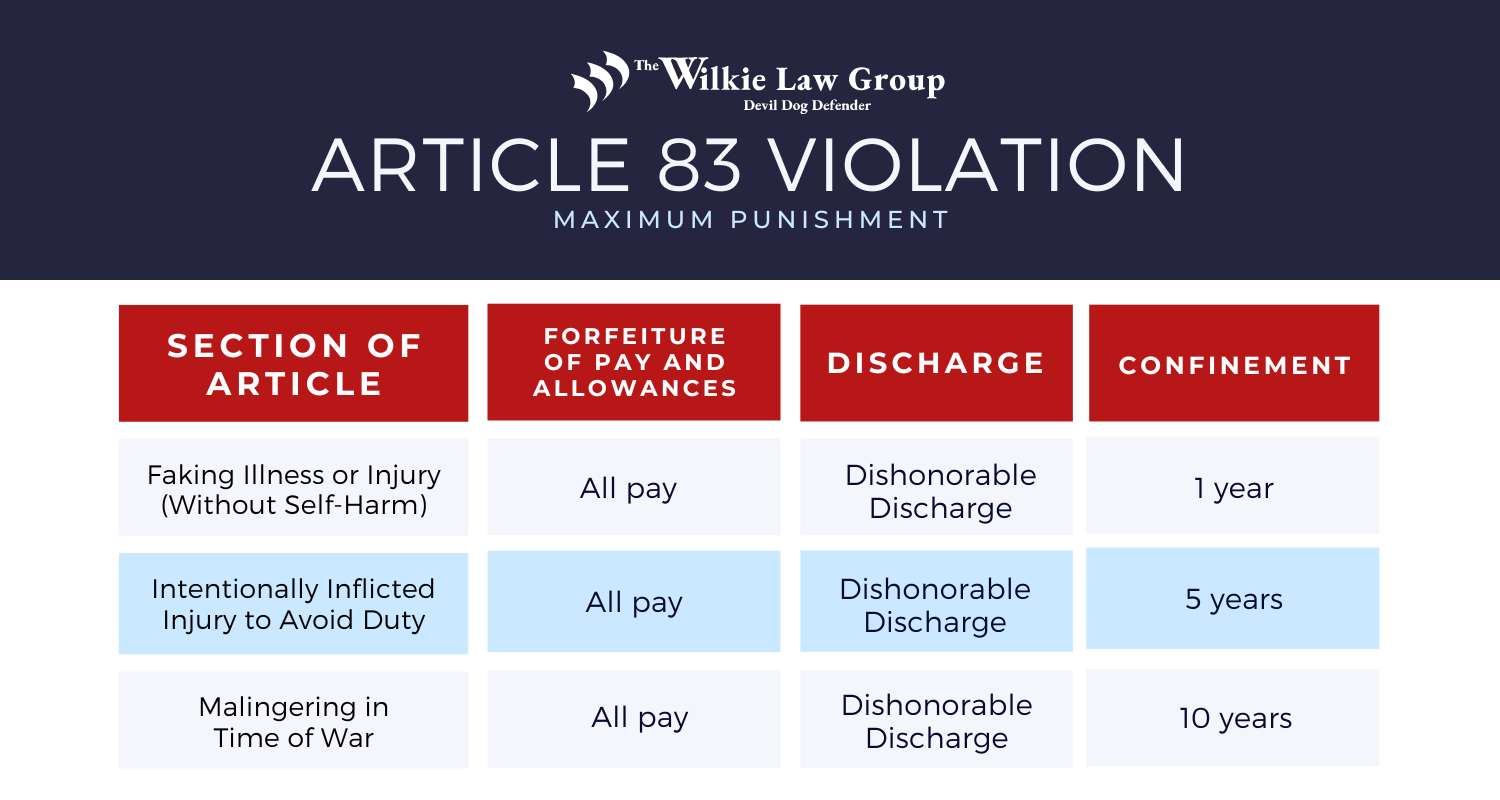Article 83 UCMJ
Aggressive Malingering Defense Attorney in North Carolina
Home » UCMJ Articles » Article 83 UCMJ
Military Counsel
UCMJ Articles
UCMJ Article 83 – Malingering
Table of Contents

The Uniform Code of Military Justice, which governs members of the United States’ armed forces, outlines a comprehensive range of laws and procedures that service members must adhere to. Violation of any article within this document can result in serious consequences. For example, those found guilty of attempting to evade military duties under UCMJ Article 83 can face various punishments, including confinement, forfeiture of pay, dishonorable discharge, and other penalties.
If you’ve been accused of violating Article 83 of the UCMJ, or any of the UCMJ articles for that matter, it is crucial to seek experienced legal representation as soon as possible. Jacksonville, North Carolina-based military defense attorney Aden Wilkie offers experienced and knowledgeable legal support for military defense cases ranging from minor infractions to serious felonies.
Call The Wilkie Law Group at (910) 333-9626 or reach out online to schedule a consultation and discuss your defense options with Aden Wilkie today.
Malingering Definition
Malingering is defined as the fabrication or exaggeration of symptoms, whether physical or psychological, with the intent of achieving a certain outcome.
Deceptive acts such as feigning illness, pretending to have a mental lapse, and exaggerating physical disablement may be utilized for the sake of various purposes. The malingering individual may hope to avoid arrest, receive medication, or achieve some other type of personal gain.
In matters of military service, malingering involves fabrication, exaggeration, or even intentional self-inflicted injury with the intent of avoiding military work, duty, or service.
What is Article 83 UCMJ?
UCMJ Article 83 (10 § USC 883) details the specifics of malingering charges in the military. Malingering acts are acts that are willfully taken with the intent of avoiding work or otherwise fulfilling military duty. Any armed forces service member who “feigns illness, physical disablement, mental lapse, or mental derangement” or who “intentionally inflicts self-injury” to avoid work, service, or duty can be subject to punishment under the military justice system.
Feigning illness or injury is a matter of pretending to be affected by a certain condition. An individual who is feigning illness, physical disablement, or mental health issues, in these cases, is often totally unaffected by any such health issue.
Some individuals may even try to make their attempts at malingering seem legitimate by taking matters into their own hands by inflicting injury to themselves. Nonetheless, service members who are found to have inflicted intentional self-inflicted injury will be found in violation of UCMJ Article 83.
The law does not consider the severity of the illness or injury feigned or self-inflicted when determining the guilt of those accused of malingering. Service members who knowingly commit any act may be accused of malingering.
How to Prove Malingering
Accusations aren’t enough to convict an individual for malingering. Successful prosecution requires sufficient evidence of intentional acts (through violent or nonviolent means) or statements that are directly linked to the service member being unable to fulfill their duties.
In other words, to prove malingering, the following elements of the offense must be confirmed:
- The accused feigned illness or injury, OR suffered self-injury;
- The action of feigning or self-injury was intentional;
- The purpose was to avoid performance, work, duty, or service.
Only when proper evidence provides proof of malingering can a service member be convicted and punished for this crime. The absence of any of these elements of offense may lead to the dismissal of the case.
Examples of Malingering
Examples of malingering under Article 83 UCMJ can vary greatly, both in the extent of the action taken and the accused’s purpose behind it.
A malingering act may involve only intentional deception, or it may involve an intentionally inflicted injury or illness to oneself to escape anything from routine responsibilities to a prospective assignment. The accused individual may commit the offense to avoid deployment to a combat or hostile fire zone or only a particular job.
To paint a clearer picture of what malingering may look like, here are a few more specific examples:
- Pretending to have a debilitating back injury to avoid an upcoming prospective assignment in a war zone.
- Feigning mental derangement by exaggerating psychiatric symptoms in an effort to avoid physical training or administrative duty.
- Committing acts of self-harm, such as cutting, burning, or breaking body parts, with the specific goal of receiving a medical discharge and evading deployment.

What is the Maximum Punishment for Malingering Under Article 83?
The penalties for malingering under Article 83 UCMJ depend on the specific act and the circumstances surrounding it, such as whether the offense occurred during a time of war or in a hostile fire zone. The punishments become significantly more severe if the accused engaged in an intentionally inflicted injury or if the conduct took place in a hostile fire pay zone.
1. Faking Illness or Injury (Without Self-Harm)
- Maximum punishment:
- Dishonorable discharge
- Forfeiture of all pay and allowances
- Confinement for up to 1 year
2. Intentionally Inflicted Injury to Avoid Duty
- Maximum punishment:
- Dishonorable discharge
- Forfeiture of all pay and allowances
- Confinement for up to 5 years
3. Malingering in Time of War
- Maximum punishment:
- Dishonorable discharge
- Forfeiture of all pay and allowances
- Confinement for up to 10 years
Additional Consequences
In addition to any punishments issued by the military, a conviction for an Article 83 UCMJ violation can lead to further unfavorable consequences. Some of those consequences include:
- Loss of VA benefits and military retirement.
- Stigma of a criminal conviction on a service record.
- Damage to future civilian employment and professional licensing.
Defending Against Malingering Allegations
If you’re facing charges under Article 83 UCMJ for malingering, it’s critical to work with a qualified military defense attorney. Attorney Aden Wilkie and his team at The Wilkie Law Group are known for building strong defenses designed to protect their clients’ records, reputations, and futures, and we’re ready to help defend you, too.
Several strategies may challenge the claim that you faked or exaggerated a condition. Here are just a few:
- Medical Documentation: One key factor indicating a false accusation is the presence of valid medical records. If your illness or injury is legitimate, these records can directly counter claims of a feigned disability.
- Misdiagnosis or Medical Neglect: If your condition was overlooked or misdiagnosed by military medical personnel, the charges may lack merit and could be dismissed entirely.
- Lack of Intent to Deceive: Even if your symptoms were misunderstood, the absence of intent is a critical defense. If you genuinely believed you were unfit for duty, that belief may negate the element of deception required to prove guilt.
Seasoned court-martial defense attorney Wilkie will examine the circumstances of your case and pursue the most effective legal path to preserve your career and freedom.
The Importance of Early Legal Representation
Early legal representation is essential in any military defense case. The sooner you involve a qualified attorney, the better your chances of protecting your rights and building a strong defense.
An experienced military defense lawyer like those at our firm can help you avoid self-incrimination during command or medical interviews, where anything you say could later be used against you. They can also arrange for independent medical evaluations if your military records don’t fully support your case, ensuring that legitimate illnesses, injuries, or disabilities are properly documented. In addition, early legal intervention allows your attorney to identify procedural or evidentiary errors in the government’s case (such as incorrect assumptions about your medical condition or intent to perform duty) which can be key to strengthening your defense.
Don’t Wait – Contact The Wilkie Law Group Today.

How Military Malingering Defense Lawyer Aden Wilkie Can Help Fight Article 83 Charges
If you’ve been accused of violating Article 83 UCMJ, seek professional representation from Jacksonville military defense lawyer Aden Wilkie as soon as possible. As a former U.S. Marine with over two decades of military experience, Aden Wilkie has firsthand knowledge of what it is like to serve in the armed forces. He also understands the severity of military criminal charges and is experienced in navigating the unique challenges of military criminal defense.
Rest assured, his deep knowledge of the military justice system and how the command investigates malingering claims will serve you well when navigating court-martial proceedings involving Article 83 violations.
Military Defense and Court Martial Representation for Service Members in Jacksonville, NC and Worldwide
Facing Article 83 UCMJ charges? Turn to Aden Wilkie for experienced, straightforward legal support focused on protecting your career and future. The Wilkie Law Group serves service members across Jacksonville, NC, with offices conveniently located near Camp Lejeune, MCAS New River, Fort Bragg, and Cherry Point.
Deployed or stationed overseas? We’re fully aware that legal issues can arise anywhere. Fortunately, Attorney Aden Wilkie is available to represent service members facing court-martial proceedings at military installations across the United States and abroad.
Contact an Article 83 Defense Attorney
If you are under investigation or facing Article 83 charges, don’t wait to get help. Early legal representation can make a crucial difference in your defense case, so be sure to secure professional legal services as soon as possible.
Contact The Wilkie Law Group today by calling (910) 333-9626 or use our online contact form to schedule a confidential consultation.
